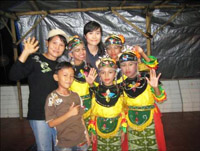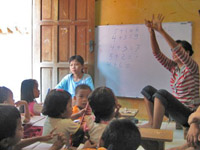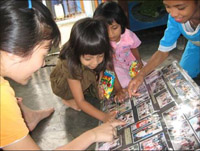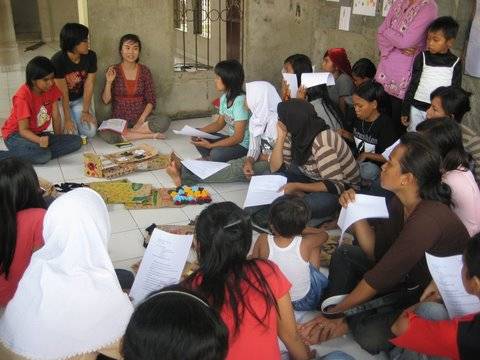인도네시아
Precious Experience in Indonesia
By Hwang Ji-yeon, Junior, Department of Family Environment & Welfare

Before telling my story of adventures in Indonesia, I should begin to talk about the reason I applied for an overseas internship program of the May 18 Memorial Foundation. That story goes back two years. . While I was hesitating to apply as a student ambassador of Chonnam National University (CNU), one of my upperclassmen who is friendly with me said, "If you let this chance go, you might be regret it in your future. Do you want to regret losing a good opportunity for a variety of experiences in your younger days?" I was totally impressed with his saying because I was just 20 years old.
I took my courage in both hands for getting a chance, and finally I got it. As an ambassador of CNU, I could be faced with more chances than before. It is one of the main roles when foreign guests visit our university we guide them and make them understand many things about our university. Through this experience I needed acquire “global-eyes” which means a person who can hold conversations of international topics. I applied to the internship program and took an opportunity to improve my global sense. Now I am in here, in Indonesia.
Difference is Nothing

On August 2, 2007, I was on an airplane heading for Jakarta, the capital city of Indonesia, which is called the “Heart of East Asia” because the headquarters of the Association of South East Asian Nations (ASEAN) is located there. While eating 'Bibim-bab' on the airplane, I thought it could be the last Korean food I could eat by the time I would return to Korea. This is only the beginning of my long journey. Before going to Indonesia I tried to get some information on living there, but I could not find any books that had information about traveling in the country or its history. I was so afraid at that time nor could I not know about the country which I would be living in for ten months.
I have known that Indonesia is a country which has the fourth-largest population in the world and most of whom follow the Islamic faith. It has the largest Muslim population in the world. In this regard, Indonesia still seems to be still a largely unknown and unfamiliar to most Koreans.

During the first month, it was most difficult to have discussions on religious matters with natives. I have no religion, but they countlessly asked me the reason why I had no any religion. It was quite unpleasant being asked such questions because I thought that religion should be a personal choice and not an obligation. Now I understand them by realizing their questions were based on different culture and background. Here is a good example. In order that they issue identification cards they should fill out their own religions in the cards under Indonesian law. To Indonesian people, religion is not a personal choice, but it is a duty and a part of daily life itself.
To overcome those difficulties was a task that I had to finish. However, I realized that I had already assimilated into the Indonesian culture and way of life. I began using my hands for eating food and began having a tolerance for hot weather. I currently know that lack of information is not important. It is the critical to have a flexible attitude for obtaining useful information and for understanding cultural differences in other countries. I kept learning all of the real Indonesia step by step. Difference is nothing!
Into the Urban Poor Community
Through the internship program, the May 18 Memorial Foundation dispatches student volunteers to the Urban Poor Consortium (UPC), where I will have worked as an intern until May, 2008. The UPC is a kind of NGO in Indonesia that works with the urban marginalized groups and international volunteers to solve Indonesian urban poverty problems. To defend the rights of the urban poor, it aims to develop strong people’s organizations and networks, through which they can reclaim their right to live healthy and safely as human beings in the city, Jakarta.
The goal of the UPC is grassroots empowerment through advocacy, organizing and networking. The grassroots organizing programs is divided into alternative health care, children’s learning and saving through garbage recycling. There are 32 communities managed by the UPC in Jakarta. The communities are usually formed along rivers and around railroads in the city, and their residential environment do not have any facilities like water supplies that are close. They should even procure water for drinking and washing from a distance waterworks office after payment all the time. To make matters worse, they become poorer and poorer owing to the lack of jobs.

I can speak Indonesian smoothly for conversation with others in the office and the communities in three months after that decision, and then I feel more familiar with them and to get opportunities for direct communication. As a result, I could know the details of their conditions better. Since then, I have tried to do my volunteer service activities harder. I started to investigate child abuse problems in poor families. I hope my research data could be adopted to improve children’s condition in urban poor families.
Pursue Your Desire
It is not simple to live alone by myself in a foreign country, but I am sure that during the internship term I acquired a variety of experience. Though I am still a student, I have lived a social life as a staff member of an NGO before graduation. I would like to say to CNU students, “Pursue your desire in your younger days, and jump into the new and unfamiliar world for your better future.”

